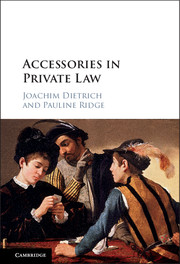4 - Accessories in criminal law
from PART I - General principles
Published online by Cambridge University Press: 05 February 2016
Summary
The relevance of criminal law to private law
There has been some debate as to whether the criminal law can be used to elucidate the private law of accessories. After considering the arguments, we conclude that there are similarities between the two areas of accessory law. Consequently, this book draws on the criminal law where it appears relevant and, to that end, provides a general overview of criminal law.
Although there are obvious parallels between accessory liability in private and criminal law, the question is whether the well-developed (albeit complex and uncertain) criminal law jurisprudence can further our understanding of civil accessory liability. Some judges assert, without necessarily full substantiation, the view that the criminal law is in a problematic state and therefore perhaps unhelpful as a source of guidance. Further, and undeniably, there are some fundamental differences between civil liability and liability as an accessory to a crime. These include the following.
First, criminal law seeks to deter and punish unacceptable social behaviour, whereas civil law is focused on who, as between the accessory (A) and claimant (C), ought to bear a particular loss, or benefit from a particular gain. Indeed, in civil claims, C will often seek remedies against an accessory because of practical impediments to pursuing claims against the primary wrongdoers (PWs) (such as their insolvency). In criminal law, by way of contrast, the moral quality of A's conduct – whether it is sufficiently antisocial and culpable – is the overriding concern. Peter Cane has encapsulated the differences in terms of mental fault and conduct being the main focus of criminal law, whereas causation and the consequences of particular conduct are the focus of civil law. Of course, this does not mean that causation and consequences are not also important in criminal law, and that personal culpability is not important in civil liability.
Secondly, it can be argued that the opprobrium of being found guilty of a crime as an accessory and the consequent punishment is more severe than being found liable as a civil accessory. Interestingly, where a conviction for a serious crime is at issue, one might therefore expect that the law is restrained in extending accessory liability too far. Yet perhaps anomalously, criminal liability in some circumstances is potentially very wide-ranging [4.5.2]. It cannot be assumed that criminal law liability is necessarily narrower than civil liability.
- Type
- Chapter
- Information
- Accessories in Private Law , pp. 66 - 90Publisher: Cambridge University PressPrint publication year: 2016



